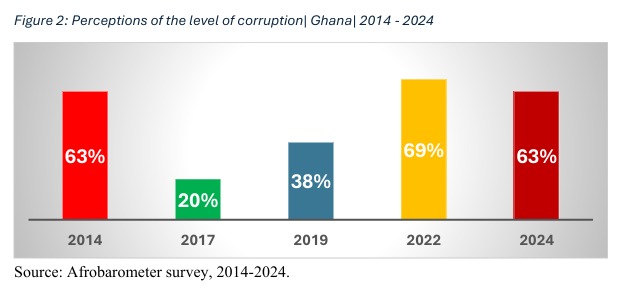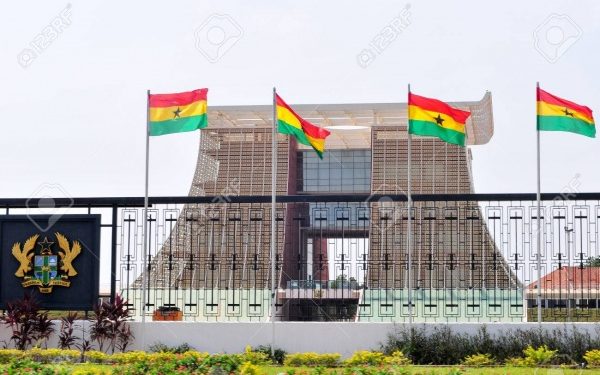Perception of Corruption at Presidency Rises Sharply to 54% – State of Corruption Report
The 2024 State of Corruption Report published by the Ghana Anti-Corruption Coalition (GACC) has revealed a significant rise in the perception of corruption among the President and officials at the Presidency, noting a 38-percentage point increase from 16% in 2005 to 54% in 2024.
According to the report, the Presidency, which was among the least perceived corrupt institutions nearly two decades ago, has now become the third most perceived corrupt institution, behind Tax officials and the Ghana Police Service.
Members of Parliament have also witnessed a marked shift in public perception, ranking as the fourth most corrupt institution in the latest survey, compared to their low-ranking status in 2005.

“Of great concern is the changed perception of two institutional actors – the President and officials in his office, and Members of Parliament. In 2005, these two were the least perceived to be corrupt. In 2024, they rank among the most perceived to be corrupt,” the report stated.
The report, which assesses Ghana’s efforts in combating corruption between January and December 2024, described the country’s anti-corruption progress as stagnant. Despite numerous interventions by both state and non-state actors, the report indicates that Ghana has failed to significantly move the anti-corruption needle.
Notably, the GACC highlighted that several critical legislative reforms recommended in the 2023 report—particularly the passage of the Conduct of Public Officers Bill—remain unimplemented. This, the report suggested, casts doubt on the political will of key policy actors in genuinely advancing the anti-corruption agenda.
Corruption Indices and Public Sentiment
On Ghana’s performance on global corruption indices and surveys, the report highlighted four key observations:
Stagnation in the fight against corruption.
Increasing public perception of institutional corruption.
Failure of safeguards and reforms to curtail corruption.
Poor public evaluation of government-led anti-corruption efforts.
Using data from the 2024 Afrobarometer survey, the GACC report noted a deepening public belief in institutional corruption and growing pessimism about the government’s commitment to anti-corruption.

The report further identified a widening gap between citizens who believe they can report corruption without fear and those who fear retaliation or repercussions for speaking out.

Institutional Responses and Civil Society Role
The report acknowledged some positive actions by state accountability institutions, including ongoing investigations and prosecutions of alleged corruption cases, enhanced capacity building for public officials, and citizen sensitisation campaigns.
Civil Society Organisations (CSOs), the report noted, continued to play an integral role in the anti-corruption ecosystem. Key interventions by CSOs during the period under review included public education campaigns, policy advocacy, and stakeholder capacity building. The report commended the persistent commitment of non-state actors in the face of daunting challenges.
Despite these efforts, the report stressed that the country’s anti-corruption architecture remains vulnerable, plagued by weak enforcement, political interference, and limited accountability mechanisms.
Recommendations
The GACC called for urgent implementation of long-standing legislative proposals, particularly the Conduct of Public Officers Bill, as well as stronger support for accountability institutions. It further urged for a recalibration of anti-corruption strategies to include more citizen engagement, transparency in public office, and systemic reforms that insulate institutions from political influence.
The 2024 State of Corruption Report ultimately calls for renewed urgency in addressing corruption, warning that continued deterioration in public trust could undermine democratic governance and investor confidence in Ghana’s economy.








